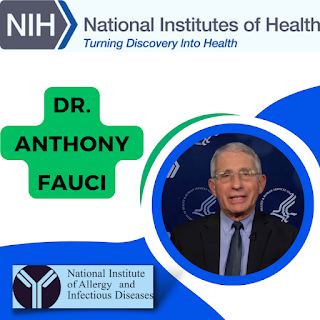Anthony Fauci: A Trailblazer in Public Health
Dr. Anthony Fauci is a name that has become synonymous with the fight against COVID-19. As an immunologist and the director of the National Institute of Allergy and Infectious Diseases (NIAID), Dr. Fauci has been at the forefront of America's response to the pandemic. But his work in the field of infectious diseases spans over four decades and includes groundbreaking research on HIV/AIDS and other viral diseases. In this blog, I will delve into the life and career of Dr. Fauci, exploring his contributions to public health and the scientific community and the impact of his leadership during the COVID-19 pandemic.
Early Life and Education
Dr. Anthony Fauci was born in Brooklyn, New York, in 1940 to Italian-American parents. He grew up in a close-knit family, with his father working as a pharmacist and his mother as a homemaker. From an early age, Fauci was interested in science and medicine, and he attended Regis High School, a Jesuit school in Manhattan.
After graduating from high school, Fauci attended the College of the Holy Cross in Worcester, Massachusetts, where he received a Bachelor of Arts degree in classics in 1962. He then went on to attend medical school at Cornell University, where he earned his medical degree in 1966.
Following medical school, Fauci completed an internship and residency in internal medicine at the New York Hospital-Cornell Medical Center. He then went on to complete a fellowship in infectious diseases at the National Institutes of Health (NIH) in Bethesda, Maryland, where he has spent his entire career.
A Career in Infectious Diseases
Dr. Anthony Fauci has had a long and distinguished career in the field of infectious diseases. He started working in the Laboratory of Clinical Investigation at the NIAID in 1968 as a clinical associate. He became the chief of the Laboratory of Immunoregulation in 1980 and the director of the NIAID in 1984, making him the longest-serving director in the institute's history. During his tenure, Dr. Fauci has overseen the development of treatments for a wide range of infectious diseases, including HIV/AIDS, tuberculosis, malaria, and Ebola.
Dr. Fauci is perhaps best known for his work on HIV/AIDS, which he began studying in the early 1980s. He was instrumental in the development of the first effective treatments for the disease, including the antiretroviral drug AZT. His research on HIV/AIDS has also helped to advance our understanding of the virus and its transmission. In addition to his work on HIV/AIDS, Dr. Fauci has been a leader in the fight against emerging infectious diseases. He played a key role in the response to the SARS outbreak in 2003 and the Ebola outbreak in West Africa in 2014.
More recently, Dr. Fauci has been at the forefront of the response to the COVID-19 pandemic, serving as a trusted advisor to the U.S. government and the public on issues related to the pandemic. He has been a key figure in the U.S. government's response to the COVID-19 pandemic. He has been a member of the White House Coronavirus Task Force since its creation in January 2020 and has been a leading voice in advising public health officials and policymakers on how to respond to the pandemic.
Dr. Fauci has been a strong advocate for social distancing, wearing masks, and other measures to slow the spread of the virus. He has also been an advocate for the development and distribution of vaccines and has been working closely with vaccine manufacturers to ensure that safe and effective vaccines are available as quickly as possible. Despite his expertise and dedication to public health, Dr. Fauci has faced criticism and even threats from some people who disagree with his recommendations. However, he has remained steadfast in his commitment to the fight against COVID-19 and has continued to be a trusted voice for many Americans.
Throughout his career, Dr. Fauci has been a vocal advocate for public health and science. He has received numerous awards and honors for his work, including the Presidential Medal of Freedom in 2008, the highest civilian honor in the United States. His contributions to the field of infectious diseases have helped to save countless lives, and his leadership during the COVID-19 pandemic has been praised by experts and the public alike.
Memoirs
He is a physician and a researcher, yet Dr. Fauci has also been a prolific author, with over 1,200 scientific papers published in peer-reviewed journals. He has also authored or co-authored several books on infectious diseases, including "HIV/AIDS: Advances in Research and Treatment" and "The AIDS Reader: Social, Political, and Ethical Issues."
Dr. Fauci has been recognized for his contributions to public health by numerous organizations, including the American Medical Association, the Infectious Diseases Society of America, and the National Academy of Sciences. He has also been honored with several prestigious awards, including the Albert Lasker Award for Clinical Medical Research and the Mary Woodard Lasker Public Service Award.
Present Life
Dr. Anthony Fauci is still the director of the NIAID at the NIH. Dr. Fauci's role in the COVID-19 response has brought him into the public eye like never before. He has become a household name and a trusted source of information on the pandemic. Despite facing criticism and even threats for his work, Dr. Fauci has remained committed to public health and science. In addition to his work on the COVID-19 pandemic, Dr. Fauci continues to oversee research on a wide range of infectious diseases at the NIH. He is also a sought-after speaker and has been featured in numerous interviews and documentaries.
Despite his many accomplishments and accolades, Dr. Fauci remains humble and committed to his work. At the age of 80, Dr. Fauci shows no signs of slowing down. He remains committed to public health and science and continues to be a leading voice in the fight against infectious diseases. He has said that his greatest reward is seeing patients get better and has emphasized the importance of continued research and innovation in the field of infectious diseases.
Conclusion
Dr. Anthony Fauci is a remarkable scientist, physician, and public health advocate whose expertise and dedication have made him a trusted voice in the scientific community and a household name. His pioneering work on HIV/AIDS and his leadership during the COVID-19 pandemic have saved countless lives and helped to advance our understanding of infectious diseases. As we continue to face new and emerging infectious diseases, Dr. Fauci's work will remain more important than ever. We can all learn from his commitment to public health and his unwavering dedication to advancing scientific knowledge. Dr. Fauci is a true hero and a shining example of what we can achieve when we put our minds and hearts to work for the greater good.






Good one 👍
ReplyDeleteThank you !!! ❤️
Delete